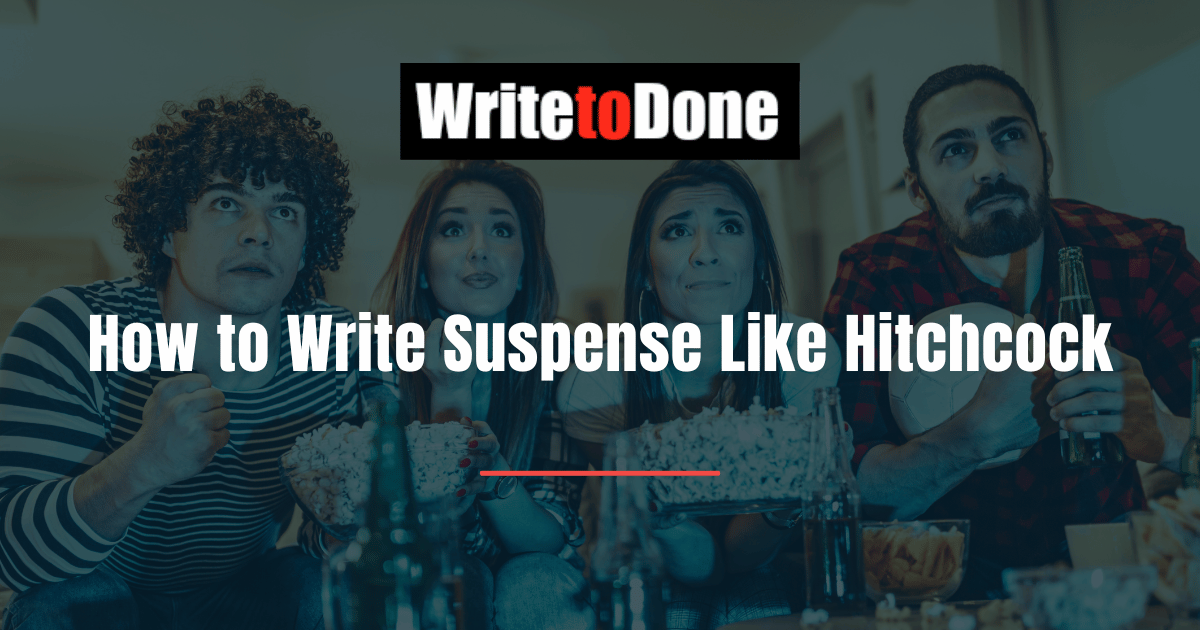Alfred Hitchcock was dubbed the ‘Master of Suspense’ because his films, many adapted from novels, short stories and plays, were masterful at building suspense and tension in the minds of the audience or reader.
But what is suspense? It could be described as the stretching out of anticipation. And what is the difference between mystery and suspense? The two terms often get confused. So let’s hear it from the ‘Master’ himself; ‘Mystery is an intellectual process, as in a ‘whoddunit’. . .but suspense is essentially an emotional process. With suspense it’s necessary to involve emotion.’
Nearly all stories do well with suspense, no matter the genre. Even a love story can have suspense. Suspense has largely to do with the audience’s own desires or wishes, so getting it right is a very important part of the writing process.

The mystery in Hitchcock’s Psycho, is who is behind the murders at the Bates motel? We think it is ‘Mother’ until the shocking denouement. These are mysteries that run throughout the film. Suspense on the other hand, is an emotional process, rather like a rollercoaster ride, or a trip to the haunted house.
All suspense comes out of giving the audience information. If you tell the reader that there’s a bomb in the room and that it’s going to go off in five minutes, that’s suspense. The suspense in Vertigo is what will happen when James Stewart’s character Scottie discovers that Judy has deceived him and is really Madeline? The reveal happens two thirds of the way through the film.
The number one rule with suspense then, is that you must give the audience information. A good example of suspense building occurs in The Birds when Melanie Daniels sits in front of a jungle gym outside the school. Unbeknownst to her, one crow lands on the bars of the jungle gym behind her. As she continues to smoke obliviously, two, three, four more crows gather on the jungle gym. Finally, Melanie notices that the gym is covered in a mass of menacing crows. The suspense in this scene is so exciting because it comes from the audience knowing more than the characters.
In Psycho, the audience knows that Arbogast the detective, and then plucky Lila Crane are in danger, when they enter the Bates House, but they don’t which makes the scenes so much more suspenseful. If you let the audience or the reader in on the secret early on, so they will feel anxious, otherwise you have five minutes of surprise during the reveal, like the bomb going off.
In The Man Who Knew Too Much, Hitchcock lets the audience know the exact moment an assassination attempt is to be made at an Albert Hall diplomatic concert – the strike of an orchestra’s cymbals. By pre-familiarising the film’s audience with the piece of music, and cutting repeatedly to the percussionist holding the cymbals, he builds up to the possible moment of murder, which becomes filled with suspense.
The golden rule then is to let the reader in on the secret and involved them in the suspense building. In Psycho, the audience knows more than the characters when detective Arbogast enters the Bates house to investigate, which becomes one of the most suspenseful scenes in Hitchcock. We can’t help but feel anxious for Arbogast as we know that the murderous Mrs. Bates is waiting for him at the top of the stairs.
In a mystery, you don’t need to answer every question, it’s important to leave some questions unresolved, so that the audience will be thinking about them at the end of the book. One example of leaving a mystery open ended, occurs in Vertigo when Scottie follows Madeline to the McKittrick Hotel. We never see Madeline leave the hotel, and question why. Hitchcock said, ‘That’s why it’s a mystery.’
Hitchcock called this the ‘Ice box syndrome’, referring to the moment when a couple discusses the plot or something is troubling them, and they reach into the ‘ice box’ or refrigerator. The mystery at the end of my novel Ghost Maven is what happens to the central characters. And of course, it opens up the possibility of an exciting sequel.


















